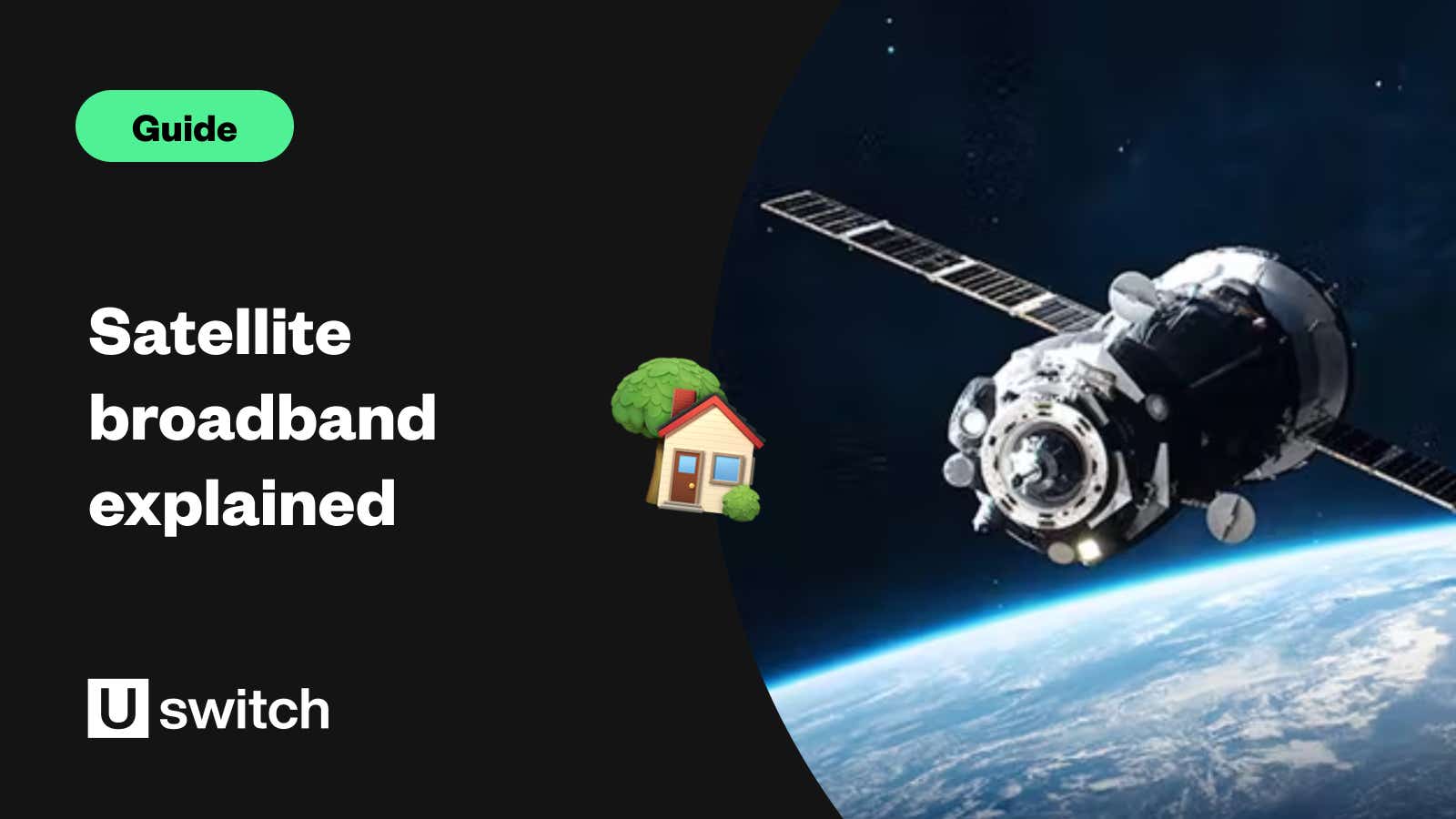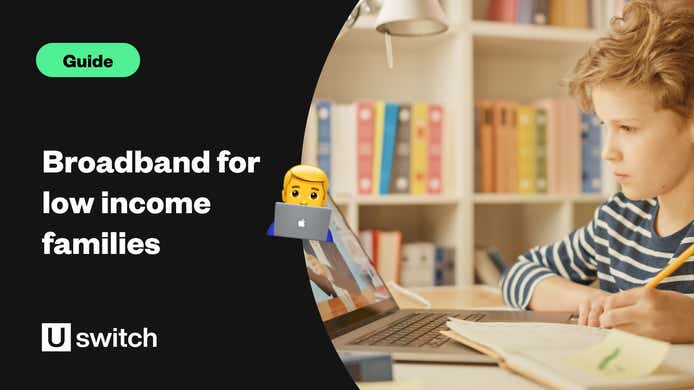Satellite broadband is an alternative way of getting internet in your home. Just like satellite TV, it’s beamed all the way from a telecoms satellite in space to a satellite dish installed on your property. It then gets hooked up to a Wi-Fi router just like normal broadband.
Because it doesn’t rely on a network of cables going into every home, it’s expected to become a favourable option for people living in rural areas in the years to come.
And while a small number of UK households already use some form of satellite broadband, new upgrades to the technology are set to make satellite internet a much faster and more reliable option than it previously was.
Notably, companies like SpaceX and Eutelsat OneWeb are leading the charge, with satellites that can provide internet speeds of up to 300Mbps. That’s much faster than the UK average speed, which currently stands at 69Mbps.
To put this into perspective, you could use satellite broadband to download a two-hour HD film in around four and a half minutes, but it would take roughly 17 minutes with a speed of 69Mbps.
Read on to learn about satellite broadband, and if you could benefit from it once it becomes available to you.
What is satellite broadband?
While the rollout of full-fibre means that the majority of UK households should be getting much faster broadband speeds before the end of the decade, many rural properties are unlikely to see the benefits any time soon.
Full fibre is both difficult and expensive to install at some of these locations, so homeowners often have to look for different types of broadband to get connected to the internet.
This is where satellite broadband could help. It’s a home internet connection shared between a personal satellite dish and one of the many communications satellites high above us in low Earth orbit.
For remote areas, or homes that are completely separated from neighbourhoods, a satellite broadband connection can be the answer to getting online. Some properties are just too hard-to-reach for providers to lay physical fibre cables. But satellite connections can cover pretty much anywhere in the world (provided you have a dish to receive it).
How does satellite broadband work?
Normal communications satellites work by transmitting radio waves to antennas down on Earth. Those antennas then provide our connected devices with the signal they need to communicate, which is how mobile phone calls and mobile internet connect.
These satellites have been providing internet to a small number of isolated properties for years. But the technology is quite old now, so it’s a lot slower and it can’t handle as many devices as other types of broadband.
Thankfully though, this is all changing. The latest satellite broadband companies use laser light to transmit broadband data, rather than the radio waves relied on for older satellite connections. And this will lead to a huge overhaul in both the speed and availability of the technology.
Both lasers and radio waves move at the speed of light, so it isn’t technically the ‘speed’ the data travels that makes the difference. However, lasers move on a much higher frequency than radio waves do, so much more data can be transferred through them at any given time.
That’s why we often refer to broadband speed as ‘bandwidth’ because it’s not necessarily how fast data travels, but how much data can be transmitted at once.
How fast is satellite broadband?
So what actually are the speeds you can get from satellite broadband?
Well, while older satellites could only manage average broadband speeds similar to standard copper broadband (10Mbps), Starlink, OneWeb and other satellite internet providers can now occasionally reach up to 300Mbps.
That’s comparable to speeds you can get with fixed-line full-fibre broadband, which is a significant improvement upon the older technology. Those speeds could future-proof a home for years, and could finally provide an ultrafast, ultra-consistent broadband connection for the UK’s most remote households.
Which satellite internet providers are in the UK?
There are a number of satellite broadband providers offering the older, slower satellite internet connection to a small number of households in the UK. But as for the new, much faster service, there are currently only two in operation. And only one of them is actually available in the UK for commercial use right now.
Availability is expected to grow rapidly throughout this decade though, so make sure to keep an eye out for more providers.
Starlink satellite internet

Starlink disrupted the satellite internet industry back in 2020 when it officially launched, making satellite internet theoretically available all across the globe. In May 2019, the initial group of satellites was sent into orbit with more being sent up year on year.
The network holds several advantages over its rivals, by offering a relatively simple operation, delivering data consistently with minimal latency and impressive speed.
Is Starlink available in the UK?
Starlink has been accessible in the UK since 2021, with coverage extending across nearly the entire country, except for the northernmost parts of Scotland.
Results from approximately 500 tests conducted by ThinkBroadband between March 2022 and August 2022 in Northern Ireland, Wales, Scotland, and England revealed:
Average download speed: 106.1Mbps
Average upload speed: 9.72Mbps
During this period, maximum speeds reached 293Mbps for downloads and 33Mbps for uploads, while the minimum recorded speeds were 2.5Mbps for downloads and 1.2Mbps for uploads. It's evident that Starlink UK speeds vary from the stated figures, but considering the network's early stage of development, these results are indeed impressive.
Eutelsat OneWeb
Eutelsat OneWeb is a subsidiary of Eutelsat, a French satellite operator based in Paris, and UK company OneWeb, which is commercially based out of London.
OneWeb started to emerge as the UK’s leading satellite broadband provider in the 2010s, but it had to restart its operations after collapsing in early 2020. The UK government then won the bid for its assets, acquiring it in partnership with Indian company Bharti Global for around $500 million.
In July 2022, it was announced that Eutelsat had agreed an all-share merger with Britain's OneWeb to become Eutelsat Group, with the official takeover being completed in September 2023. So far it has launched around 634 satellites into low Earth orbit and provides connectivity in 37 countries across the globe.
In May, countries such as Austria, Italy, France and Portugal were added to its coverage area, as well as the west coast of the US from Washington to California; the northeast coast from Maine to Virginia; and the Midwest. It also expands coverage in Canada and maritime regions. Previously, OneWeb was operating at 50 degrees north, which means it covered the Arctic, Alaska, Canada, the UK and elsewhere.
Other satellite broadband providers
There are quite a few satellite internet providers to choose from. However, aside from the above brands, these companies will only be offering standard satellite broadband speeds of around 10Mbps. This is a lot older and slower than what the above providers can offer, and it’s still quite expensive for what you get from it.
If you have 4G coverage where you live, you might be better off looking for a mobile broadband deal. They’re cheaper, faster and a little more reliable than a standard satellite connection.
However, if you’re already in a very rural area, 4G might also be hard to come by. So in this case, a standard satellite broadband or ADSL connection will probably work better for you.
How to get satellite internet
You can check Starlink’s availability to your address on the Starlink website.
Other satellite internet providers that offer the older technology might have better availability than OneWeb at the moment. Take a look at ISPreview’s list of satellite broadband providers available in the UK to see if your home could access their services.
Beyond an engineer installing a satellite dish at your residence, the process closely resembles the typical procedure for acquiring a standard broadband contract (although self-installation is an option with some Starlink packages).
It's important to note that satellite internet equipment and installation expenses can be relatively high, so it's advisable to be financially prepared.
The initial step involves reaching out to your chosen satellite broadband provider. They will offer guidance on selecting the most appropriate package to meet your requirements. In most cases, you'll be required to make an upfront payment for installation and activation. At this stage, the provider will also assist you in setting up your monthly payment plan.
Finally, on a mutually agreed upon date and time, the installation and connection process will occur. The duration of installation may vary based on any specific challenges posed by your property, which the engineer will address. When the engineer completes the setup, your internet connection via satellite will be established.
How expensive is satellite broadband?
Due to the equipment you need installed to use satellite broadband at home and the high costs of business that providers have to deal with, it can be very expensive. It’s especially pricey when compared to other types of broadband that offer the same, or faster, speeds.
Just getting a satellite dish installed at your property for it to work can cost upwards of £400, and the monthly bill you’ll then be charged is much higher than most entry-level fibre broadband deals. And Starlink, which offers much faster satellite broadband, currently charges £75 per month. This is significantly more expensive than almost every gigabit-speed broadband service.
These charges make satellite broadband potentially the most expensive type of broadband you can get.
Should I get satellite broadband?
For the majority of UK residents, the answer is not yet.
While its speeds are now quite impressive, it will be a very long time before it’s priced anywhere near the same level as the more widely available types of broadband. If your options for broadband are limited, it might have to be a consideration, but it’s best to avoid it if you can help it. At least until it becomes a much more competitive option.
Essentially, you would have to be comfortable with the cost of a satellite broadband service in order to be happy with the service you get from it. And if you’re at all concerned about price, you should definitely seek an alternative type of broadband.
While you wait for satellite broadband to find its feet, it’d certainly benefit you to compare broadband deals in the meantime. Fast fibre deals are getting cheaper by the year, so if you haven’t switched in a while, you could make a huge saving on a speedy package.
Our best broadband deals
Search Uswitch to find the right broadband plan for you.




